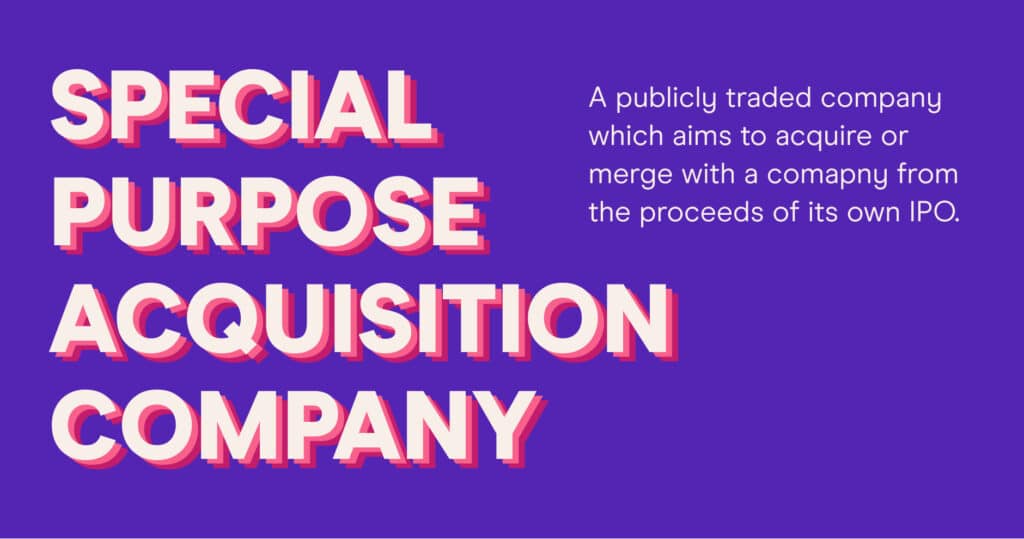It’s possible to think that the Spac boom is near its end. We can approach this through theory, we can approach it through cynical realism, we can approach it through recent results. This isn’t to say that no Spac (or “despac”) deal is ever going to work but perhaps it’s time to admit that the likely outcome is not going to be a happy one.
For those not up to speed here. It’s long been possible for a company to join a stock market without going through all that boring process of being vetted by the SEC and gaining permission. Just merge with a company already on the stock market. That’s gotta be possible otherwise no stock market company could ever buy a private business. When the market listed company was a shell, just a quote and maybe a cash pile, we called that a “shell” company. See how that works?
What is a Spac?

OK, so bright eyed financiers decided to float companies that would just be a shell. Spacs – Special acquisition companies. They would have cash, from shareholders, plus a quote. They’d be able to merge with a private sector business without all that SEC stuff. Also, perhaps, cheaper than using the IPO banks. OK, cool. And this did work for a time.
The theory part is that at any one time there are likely to be only a few companies ready to go public but not ready to IPO the conventional way. So, once those have all Spac’d we might see a parade of real dogs who shouldn’t be there at all. This is straight from Adam Smith – any new method of anything is great, then lots copy it, too many copy it. We’ll not insult anyone by trying to choose which of those company that did come to market shouldn’t have. But we have noted several which have already had to have reverse stock splits, a couple that have gone bust. No, no, no blushes here, just to note.
Now perhaps this could just be because the offerings recently haven’t been so good. But I’d argue that that’s not – at least not necessarily – the case. I’d argue that it’s because the entire style thing is failing. Partly simply because I’m a big Adam Smith fan and therefore assume that this will happen. But also because of the way in which several deals have….well, not failed, but been less glorious than some might have hoped. For there’s a twist to the Spac setup.
The Twist to the Spac Setup
When the acquisition company floats everyone puts in $10 for their share (leave warrants, promoter stock and so on out of this). Any anywhere along the road that $10 can be retrieved by giving up the share in the Spac company. And the numbers from recent despacs (that is, the final merger and floatation) are illustrative.
Cheche Group merged but “ As of March 1, following an extension vote, the SPAC said 2,725,066 shares were redeemed, erasing about 41% of the remaining cash held in trust as of the Cheche deal announcement in January. That left the SPAC with about $48 million in trust. Further redemptions up to the completion vote last week reduced the trust to about $4 million. At an enterprise value of $841 million, the deal was originally expected to bring Cheche about $68 million in gross proceeds. The final tally will be closer to $22 million.” The “trust” is that cash from founding shareholders. Cheche thought it was worth about $800 million and change (“enterprise value”) but all it got wsa this lousy $22 million in new capital? Worth paying the traditional IPO banks their 7% really, isn;t it?

But that’s not all. The DTOC merger with American Oncology: “All told, when combined with earlier redemptions, the SPAC lost about 99.5% of its trust, leaving approximately $1.5 million.”
Or, as a third example from just the one week, Spectral AI: “although 46% of the remaining outstanding shares were redeemed ahead of the vote. As of Sept. 6, the SPAC held about $2.6 million in trust. Rosecliff I raised $220 million in a February 2021 IPO.”
That is, we’re getting – at times – about 1% of the cash sticking around to remain in the deal.
Spac Takeaways
I don’t doubt that Spacs will continue to exist because no financial technique, once discovered, ever truly goes away. As with shell companies in fact. But the excitement has, I think, gone out of the sector. Perhaps for those theoretic and Adam Smith reasons. But in technical terms it’s because so little money is sticking around for the merger that for any company that is actually trying to raise money, why bother? And if you’re not trying to raise money then why are you trying to be on a stock market?